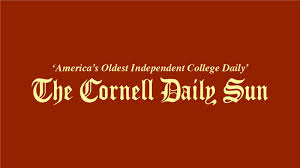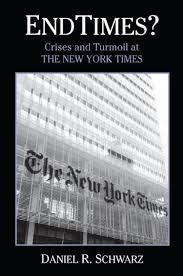
Local Coverage for Tompkins Town Hall On Trump Impacts On Community, Cornell
Editor’s Note: Cornell has no official role in encouraging the Town Hall. Any participation in it by individuals is independent of university status.
![]()
Independent Nonprofit Nonpartisan News

Speakers at Friday’s town hall (June 6, 2025) included Tompkins County Legislators Rich John (at left) and Deborah Dawson (third from the left), author and organizer Andrew Kreig (at right) and Cornell professor Risa Lieberwitz (Photo by Cereese Qusba / The Ithaca Voice).
The Ithaca Voice, Town hall focuses on local impacts of federal spending cuts — so far, Cereese Qusba, June 9, 2025. Fifteen lost truckloads of food pantry supplies. A billion dollars in federal research funding cuts. ICE arrests carried out in Ithaca despite its sanctuary city status.
The Trump administration’s policies have begun to trickle down to the local level, and the impacts are poised to deepen in the coming months.
Tompkins County residents flocked to a town hall on Friday, featuring a Cornell University professor, county legislators, and nonprofit leaders discussing the local and statewide implications and threats of the Trump administration.
The event was organized by Andrew Kreig, a Cornell graduate and a longtime nonprofit executive and author. Kreig offered an opening address, focusing on the influence of media and media framing. He was followed by Risa Lieberwitz, right, a professor at the  Industrial Labor Relations School at Cornell, who argued that the Trump administration is systematically attacking higher education as part of an authoritarian agenda.
Industrial Labor Relations School at Cornell, who argued that the Trump administration is systematically attacking higher education as part of an authoritarian agenda.
“Authoritarian regimes always attack higher education,” Lieberwitz said. “Because universities are where we find critical thinking, questioning the status quo and organizing for social justice.”
On April 8, the federal government froze over $1 billion in funding for Cornell amid Title VI investigations led by the U.S. Department of Education.
In a statement to the Cornell University community on May 7, University President, Michael Kotlikoff, right, said that significant  medical and military research is halted in response to the federal funding freeze.
medical and military research is halted in response to the federal funding freeze.
“To date, federal agencies have stopped work on or terminated more than 100 research projects at Cornell, abruptly ending ongoing research grants with no official notice of their future status,” Kotlikoff said.
Lieberwitz emphasized the Trump administration’s misuse of civil rights law, remarking that “Trump has weaponized Title VI of the Civil Rights Act—not to protect civil rights, but to silence political speech and dismantle Diversity, Equity, and Inclusion programs.”
Rich John, below, the chair of the county’s Public Safety  Committee, highlighted the Trump administration’s disruption of relations between local law enforcement and federal law enforcement, especially when it comes to immigration enforcement.
Committee, highlighted the Trump administration’s disruption of relations between local law enforcement and federal law enforcement, especially when it comes to immigration enforcement.
“So we now appear to be in a fundamentally different world where mutual trust, as we’ve operated under, is not valued,” John said. “The courtesy and respect that was ordinary is not, and we’re not being asked for collaboration.”
John noted that public safety in the local community is built on cooperation, trust and respect, which he said have been eschewed by President Donald Trump’s high-handed tactics. He warned that the administration has militarized immigration policy not just to pursue deportations, but to intimidate and bypass due process, even threatening local leaders.
Deborah Dawson, right, Tompkins County Legislator  and former U.S. Justice Department attorney, warned attendees that the Trump administration’s executive actions and the so-called “naughty list” executive order could lead to massive federal and state funding cuts, severely impacting Tompkins County’s budget and local services.
and former U.S. Justice Department attorney, warned attendees that the Trump administration’s executive actions and the so-called “naughty list” executive order could lead to massive federal and state funding cuts, severely impacting Tompkins County’s budget and local services.
She stated that approximately 35 percent of the county’s budget – roughly 15 percent in federal aid and 20 percent in state aid – is now vulnerable to potential federal funding cuts related to sanctuary policies and immigration enforcement.
Dawson specifically raised alarms about the consequences for Medicaid, SNAP, and nutrition programs, with New York State potentially losing $13.5 billion in Medicaid funds annually and facing $2 billion in new costs. This fiscal stress could cascade down to counties like Tompkins, which already pay $1 million monthly for Medicaid despite having no control over eligibility or benefits.
Attendees raised questions about how individuals, local communities, universities and advocacy groups can respond to mounting federal threats.
The panelists enforced the sentiment that “us” is the answer, urging community members to “get out of their silos” as Dawson said, and join organizing networks like Indivisible, and build systems of support across issue areas such as LGBTQ rights, housing, and environmental justice, encouraging networked resistance.
Cereese Qusba is a reporter at The Ithaca Voice, from which this story is excerpted, and a news editor at The Cornell Daily Sun working on The Sun’s summer fellowship. The Daily Sun republished part of the article in an excerpt below:
 Cornell Daily Sun, ‘The Answer Is Us’: Town Hall Responds to Local Impacts of Federal Spending Cuts, Cereese Qusba, June 10, 2025.
Cornell Daily Sun, ‘The Answer Is Us’: Town Hall Responds to Local Impacts of Federal Spending Cuts, Cereese Qusba, June 10, 2025.
Related Tompkins County Major Coverage, Including Cornell Issues
June 19

Ithaca.com / Ithaca Times, Cornell University Anticipates Layoffs as it Faces ‘Profound Financial Challenges,’  Maddy Vogel, Updated June 19, 2025.
Maddy Vogel, Updated June 19, 2025.
After a spring semester “unlike anything ever seen in higher education,” Cornell University will likely begin layoffs as it seeks reductions in personnel, operations, research and other expenditures, the university announced in a statement on Wednesday.
 In its statement, university leaders said that federal funding freezes, coupled with an unsustainable increase in university costs and expenses, have led to “significant financial shortfalls.” To combat these challenges, leadership said the university will review and cut costs, along with making permanent changes to its operational model.
In its statement, university leaders said that federal funding freezes, coupled with an unsustainable increase in university costs and expenses, have led to “significant financial shortfalls.” To combat these challenges, leadership said the university will review and cut costs, along with making permanent changes to its operational model.
The university referenced several funding challenges it has faced in recent months, including over $1 billion in federal funds frozen by the Trump administration, threats to future research funding and federal financial aid, “rapidly escalating” legal expenses and an anticipated increased tax on endowment.
“Cornell’s funding model, developed over 160 years, is strong and diversified, and has carried us successfully through many past crises,” Cornell leadership wrote in the statement. “We are now experiencing simultaneous attacks or threats on every element of that model.”
Beyond threats to its revenue, the university said it is experiencing a “marked and unsustainable increase in expenses” due to inflation, a 15% growth in staff over the past four years, and other cost pressures.
In the short-term, the university has been utilizing “institutional resources” to bridge its funding gaps but said these measures are unsustainable.
In the statement, signed by President Michael I.  Kotlikoff, right, Provost Kavita Bala, Provost for Medical Affairs Robert A. Harrington, and Executive Vice President and Chief Financial Officer Chris Cowen, university leaders said that they will take several actions to reduce Cornell’s workforce.
Kotlikoff, right, Provost Kavita Bala, Provost for Medical Affairs Robert A. Harrington, and Executive Vice President and Chief Financial Officer Chris Cowen, university leaders said that they will take several actions to reduce Cornell’s workforce.
Cornell University is the largest employer in Tompkins County, with a workforce of over 11,000, according to the Tompkins County Chamber of Commerce. It is unclear how many positions the reductions will affect.
The university announced that it would conduct a comprehensive review of programs and staff, engaging personnel from every department for streamlined processes and efficiencies.
“These efforts will reduce Cornell’s workforce — a necessity to ensure Cornell’s long-term financial viability,” the university statement said. “While we will make every effort to downsize by attrition, we anticipate involuntary reductions in headcount across the university.”
In February, the university announced a four-month university-wide hiring freeze, referencing the proposed endowment tax and research funding cuts. The hiring freeze, along with restrictions on discretionary expenses like food and travel, has been extended to remain effective throughout the 2025-26 academic year, according to the statement.
The university added that it will unify information systems across campuses and “deploy technology where appropriate” to consolidate operations.
June 3
Phi Beta Kappa Lecture, Universities Under Siege, Daniel R.  Schwarz, right, Cornell professor since 1968, and Faculty President of Cornell Phi Beat Kappa, in address to more than 250 Phil Beta Kappa students and family members, who responded with a standing ovation, Cornell University, May 23, 2025, excerpted here on June 2-3.
Schwarz, right, Cornell professor since 1968, and Faculty President of Cornell Phi Beat Kappa, in address to more than 250 Phil Beta Kappa students and family members, who responded with a standing ovation, Cornell University, May 23, 2025, excerpted here on June 2-3.
Our Phi Beta Kappa Graduation Ceremony reminds us that the mission of a research university is to discover knowledge and impart knowledge to our students. As teachers we work in partnership with our students to build a culture of excellence. Our job as professors is to transform possibility and opportunity into reality in terms of creating knowledge and giving our students the tools and confidence to take our insights further.
Our students not only explore the world but also imagine the world as it might be. They see the world with fresh vision, and they think about how they can broaden our understanding of our diverse world.
University leadership must defend what universities do in terms of encouraging possibility and opportunity for all students and of fostering objective research. At the same time, universities need to seek public support by communicating better what we do and why in our research and teaching missions.
Whether it be about possible links between childhood inoculation and autism or supposed election fraud or rewriting the history of the Jan. 6, 2020, insurrection and claiming those convicted were “political prisoners,” both University research as well as intellectual and political discussions must be based on factual evidence rather than unproven hypothesis or worse yet, outright falsehoods.
Already a target for the cancellation of research funds, Cornell has no assurance that we will not be next for even more Draconian measures. I am proud of Cornell’s trustees and senior leadership for standing firm in the face aggressive actions to undermine the independence of universities and monitor what we do.
As someone who has written about past anti-Semitism on Ivy campuses, I have no problem with this administration monitoring how Jews or any minority are treated on campuses. But that is vastly different from using the claim of rampant campus anti-Semitism to threaten withholding research funds as a way of dictating curriculum and admission policies or stipulating what books should be in the library of the Naval Academy.
As a teacher-scholar one of whose fields is narrative, I am concerned with the increasing acceptance of false narratives without a scintilla of evidence to support them. We need to learn why so many people believe such falsehoods about our universities, including the pernicious lie that our focus is on indoctrinating students.
Daniel R. Schwarz, below, is Frederic J. Whiton Professor  of English Literature and Stephen H. Weiss Presidential Fellow at Cornell University, where he has taught since 1968. He is recognized as a master teacher, an influential literary critic, and an important public intellectual. He has written 16 books covering a wide variety of subjects from renowned studies of Joseph Conrad, James Joyce, and Wallace Stevens
of English Literature and Stephen H. Weiss Presidential Fellow at Cornell University, where he has taught since 1968. He is recognized as a master teacher, an influential literary critic, and an important public intellectual. He has written 16 books covering a wide variety of subjects from renowned studies of Joseph Conrad, James Joyce, and Wallace Stevens  to examinations of critical theory, the Holocaust (above right), and New York city culture. His recent books include “Reading the European Novel to 1900” (Wiley Blackwell, 2014), “Crises and Turmoil at the New York Times, 1999-2009” (2012, left
to examinations of critical theory, the Holocaust (above right), and New York city culture. His recent books include “Reading the European Novel to 1900” (Wiley Blackwell, 2014), “Crises and Turmoil at the New York Times, 1999-2009” (2012, left ), and “In Defense of Reading: Teaching Literature in the Twenty-First Century” (Wiley Blackwell, 2008). He blogs regularly on the media and higher education for the Huffington Post and has lectured all over the world. His webpage is here.
), and “In Defense of Reading: Teaching Literature in the Twenty-First Century” (Wiley Blackwell, 2008). He blogs regularly on the media and higher education for the Huffington Post and has lectured all over the world. His webpage is here.
May 8, 2025
 Cornell University, Cornell President’s Message To Cornellians, Michael I. Kotlikoff, Ph.D., President, shown at right, May 8, 2025. Today, across all of our campuses, Cornell scientists are developing new technologies, finding better ways to treat and cure diseases, and continually expanding our understanding of life, on earth and beyond. Editor’s Note: Cornell has no official role in encouraging the Town Hall. Any participation in it by individuals is independent of university status.
Cornell University, Cornell President’s Message To Cornellians, Michael I. Kotlikoff, Ph.D., President, shown at right, May 8, 2025. Today, across all of our campuses, Cornell scientists are developing new technologies, finding better ways to treat and cure diseases, and continually expanding our understanding of life, on earth and beyond. Editor’s Note: Cornell has no official role in encouraging the Town Hall. Any participation in it by individuals is independent of university status.
The real-world impact of this work is incalculable. It strengthens our national security, protects the safety and stability of our food supply, and ensures the progress and resilience of our nation.
For decades, federal agencies have relied on Cornell and other research universities to perform the highly specialized research and development work that improves and enhances our lives. This partnership has been critical to advancing and maintaining America’s economic, political, and military strength in the postwar era. Now, recent federal actions and funding freezes have imperiled that partnership—and the work on which so much of our national well-being and strength depend.
The impact of this funding freeze is immediate and devastating. Grants that support research to prevent midair airplane collisions, find new treatments for drug-resistant prostate cancer, develop new materials for jet fighter wings, and build a miniature heart-assist pump for infants with life-threatening congenital heart disease have all been halted.
To date, federal agencies have stopped work on or terminated more than 100 research projects at Cornell, abruptly ending ongoing research grants with no official notice of their future status. Media reports have suggested that more than $1 billion in federal funding to Cornell will be suspended.
While the university is doing what it can to protect the infrastructure of our research enterprise, finding stopgap ways to pay research faculty and staff and cover the expenses of running their labs, the financial loss is not sustainable. Every campus, every college, and every school at Cornell has been impacted.
May 7

University of Southern California (USC), Prof. Howard Rodman On Accepting Academic Freedom Award, Howard Rodman, above, (professor of writing at USC School of Creative Arts and former  Cornell Daily Sun Managing editor in 1971), May 7, 2025. Remarks on accepting the Walter Wolf Award, “bestowed by the Academic Senate to a USC faculty member for defense and advocacy of academic freedom or for other manifestations of social conscience, through distinguished faculty service, teaching, scholarship, or activity as a public intellectual.”
Cornell Daily Sun Managing editor in 1971), May 7, 2025. Remarks on accepting the Walter Wolf Award, “bestowed by the Academic Senate to a USC faculty member for defense and advocacy of academic freedom or for other manifestations of social conscience, through distinguished faculty service, teaching, scholarship, or activity as a public intellectual.”
Prof. Rodman: Walter was born in Frankfurt and was able to escape Germany shortly after Kristallnacht in 1938. So he knew first-hand the horrors of the 20th century, as we are knowing, first-hand, the horrors of the 21st. Walter Wolf fought back. And so in the spirit of his example, allow me to do the same.
The process by which we internalize the power of those who oppress us:
I want to talk about this in the context of academia — learnèd helplessness, if you will, with the accent on the second syllable.
Let us take the example of Columbia University. They were told that they had to do more to combat antisemitism — which in this case meant turning their campus into an armed fortress, calling in the NYPD, ratting out protesters to ICE.
They did absolutely everything asked of them. Their reward? Their president was hauled before a House Committee, was humiliated for not having done enough, was fired.
And more: four hundred million dollars in federal funds were frozen. Columbia was told to put one of its departments into receivership, to sign a consent decree monitored by the judicial system. As we speak, Columbia is negotiating the terms of that surrender.
The lesson that should be drawn: any small obedience to tyrants only emboldens them to demand further obedience.
The lesson that USC drew from Columbia was
very different: let’s chip away at our mission ourselves in hopes that they won’t take the rest of it away from us.
Learned helplessness, masquerading as strategy, as N-dimensional chess. So we scrubbed certain words from our websites — if you think of it, not all that different than burning books.
Our strategy, if we have one, has not been to stand with our sister institutions — when they came for Harvard, we remained silent — but rather to deploy the ‘Trojan caucus’ in an attempt to limit the depredations demanded of USC. What, alas, this signals to the world: we want to save our own skin, but only our own skin.
…we betray our University. And we betray ourselves.
Howard A. Rodman, right, is Professor, School of Cinematic Arts,  University of Southern California. Other posts and honors include:
University of Southern California. Other posts and honors include:
May 2
Cornell Daily Sun, Cornell Law Professor Initiates Several Federal Investigations  into Ithaca’s Educational Institutions, Giselle Redmond, May 2, 2025. Ithaca City School District is one of the institutions under federal investigation for race-based discrimination.
into Ithaca’s Educational Institutions, Giselle Redmond, May 2, 2025. Ithaca City School District is one of the institutions under federal investigation for race-based discrimination.
Both Ithaca College and the Ithaca City School District are currently being federally investigated in response to complaints filed by the Equal Protection Project, an organization founded by Prof. William Jacobson, a Cornell Law professor.
Jacobson created the EPP in 2023. In a statement to The Sun, Jacobson wrote that he founded the organization in response to “discrimination done in the name of DEI,” which they view as “a dehumanizing group ideology that reduces people to proxies for their group.”
Since its founding, the organization has challenged over 200 programs and scholarships at over 70 institutions over the past two years, according to Jacobson.
In June 2024, the EPP filed a complaint to the OCR, stating that two scholarships offered by Ithaca College violated Title VI of the Civil Rights Act of 1964, which “prohibits discrimination based on race, color, or national origin in programs or activities that receive federal financial assistance.”
The EPP claimed that the African Latino Society Memorial Scholarship and Rashad G. Richardson “I Can Achieve” Memorial Scholarship were discriminatory because they were only offered to students of color.
These scholarships both aim to support students who have improved the lives of POC in the Ithaca community, according to Ithaca College’s website.
On March 13, Jacobson received a letter from the OCR that opened an investigation into his complaint to assess whether or not Ithaca College restricted access to scholarships based on race or color.
In a statement to The Sun, Dave Maley, director of public relations at Ithaca College, denied Jacobson’s allegations.
“Ithaca College does not discriminate on the basis of race in the awarding of the scholarships,” Maley wrote. “We are confident that our programs and resources are in compliance with applicable Civil Rights laws.”
According to Ithaca College’s scholarship descriptions, ideal candidates for the scholarships would “have made significant contributions toward improving the quality of life for BIPOC youth” and “[exemplified] leadership in programs with the BIPOC Unity Center or other programs across campus.” Race or color are not listed as criteria for the scholarships.
However, according to the EPP complaint, a previous version of the website stated that the Richardson Scholarship was to be awarded to “a high-achieving, student of color” and the ALS scholarship to “a student of color at Ithaca College who has made significant contributions to the Ithaca College campus.”
Just two months after filing a complaint against Ithaca College, the EPP filed another complaint — this time against the Ithaca City School District on Aug. 12.
The complaint was regarding the school district’s Students of Color United Summit, an event aiming to uplift students of color from within the ICSD. The event’s website, which has since been taken down, specified that it was a “closed event ONLY for SOC from 6th-12th grade.”
May 1

Cornell Daily Sun, Commentary: U.S. Universities in Crisis: The Implicit and Explicit Threat of Nationalization,  Daniel R. Schwarz, below right, May 1, 2025. Using the threat of withholding research funds and taxing endowments, Trump and his acolytes are trying to nationalize universities. Under the guise of fighting antisemitism, they want to put universities under the auspices of various kinds of monitors, perhaps in some cases judges, who will control what universities do.
Daniel R. Schwarz, below right, May 1, 2025. Using the threat of withholding research funds and taxing endowments, Trump and his acolytes are trying to nationalize universities. Under the guise of fighting antisemitism, they want to put universities under the auspices of various kinds of monitors, perhaps in some cases judges, who will control what universities do.
Disregarding democracy, autocrats are bullies who stifle dissent and debate to impose their worldview. The Trump administration lives by intimidation, whether it be directed at the press, the legal establishment, cultural resources or the media.
Defending the right to express fact-based opinions and different interpretations of the same facts, universities must resist intimidation by an authoritarian regime that seeks compliant silence in the face of outrageous demands. Universities’ leadership must not follow the example of some leaders of the U.S. media, medical, educational, legal and corporate worlds who have been cowed into silence and succumbed to threats.
Despite Columbia University agreeing to his conditions, it still has not had its $400 million released because Trump’s end game is to continue making new demands on universities until they capitulate to his conditions on admission as well as his stipulations for muzzling free speech, hiring conservatives, testing the politics of foreign students and dismantling programs that encourage diversity and inclusion.
The failure of the GOP majority in Congress to resist or challenge Trump enables him to rule by executive order, which means ruling by decree. As Frank Bruni and others have remarked, we have entered a world of unpredictable darkness.
A personal note: When I was a guest at Peking University four years after the 1989 Tiananmen Square student protest demonstrations, which ended with the army massacring 200 protestors, the university was run by the army. Professors were humiliated when they came to work, having to show their credentials every day. I was told my lecture would be heard by party factotums whose reports could jeopardize my hosts. That is what happens when universities fall under government control.
U.S. universities must be independent of government control. Those who understand the role of universities in a democracy applaud Harvard’s president, Alan M. Garber, who refused to capitulate: “Neither Harvard nor any other private university can allow itself to be taken over by the federal government.” Nor, I would argue, can the great public universities submit to government interference even though they are vulnerable to state interference.
Daniel R. Schwarz is Frederic J. Whiton Professor of English and Stephen H. Weiss Presidential Fellow at Cornell University where he has been a faculty member for 57 years.
April 18

Cornell Review, Why the Endowment Won’t Solve Cornell’s Problems, Staff Report, April 18, 2025. Cornell is facing many challenges, particularly the Trump Administration is suspending $1 billion in federal research grants due to alleged antisemitism and improper diversity, equity, and inclusion (DEI) programs.
For the year ending June 30, 2023, Cornell received $157 million in state and federal appropriations, $826.5 million in federal grants, and $70.7 million in state grants. This compares with $307 million in grants from the private sector. Yet, all of these are small parts of Cornell’s $5.9 billion in annual operating expenses.
In response, many people are asking whether Cornell can withstand this challenge by using its endowment to fill the gap. As of March 2025, the endowment was worth $10,332,429,674, which is the 14th largest in the country. However, most experts claim that a better measurement is the endowment per student, and Cornell ranks 71st by that measure.
April 14

Ithaca.com / Ithaca Times, At Least Six Cornell Students Have Had Visas Revoked By State Department, Matt Dougherty, April 14, 2025. A  map published by We Are Higher Ed, above, shows universities across the northeastern United States where international students have had their visas revoked or SEVIS records terminated.
map published by We Are Higher Ed, above, shows universities across the northeastern United States where international students have had their visas revoked or SEVIS records terminated.
One marker identifies Momodou Taal, a Cornell graduate student whose visa was revoked in March following his participation in pro-Palestinian protests.
April 8
![]() New York Times, Trump Administration Freezes $1 Billion for Cornell and $790 Million for Northwestern, Officials Say, Michael C. Bender and Sheryl Gay Stolberg, April 8, 2025, Updated April 15, 2025. The funding pause amid civil rights investigations into both universities sharply escalates the Trump administration’s campaign against elite colleges.
New York Times, Trump Administration Freezes $1 Billion for Cornell and $790 Million for Northwestern, Officials Say, Michael C. Bender and Sheryl Gay Stolberg, April 8, 2025, Updated April 15, 2025. The funding pause amid civil rights investigations into both universities sharply escalates the Trump administration’s campaign against elite colleges.
The Trump administration has frozen more than $1 billion in funding for Cornell and $790 million for Northwestern amid civil rights investigations into both schools, two U.S. officials said.
 The funding pause involves mostly grants from and contracts with the Departments of Agriculture, Defense, Education and Health and Human Services, according to the officials, who spoke on the condition of anonymity to discuss the unannounced decision.
The funding pause involves mostly grants from and contracts with the Departments of Agriculture, Defense, Education and Health and Human Services, according to the officials, who spoke on the condition of anonymity to discuss the unannounced decision.
The moves are the latest and largest in a rapidly escalating campaign against elite American universities that has resulted in billions in federal funds being suspended or put under review in just over a month. Other schools that have had funds threatened include Brown, Columbia, Harvard, the University of Pennsylvania and Princeton.
Cornell and Northwestern are both facing investigations into allegations of antisemitism and into accusations of racial discrimination stemming from their efforts to promote diversity.
Cornell officials said in a statement that they had received more than 75 stop-work orders from the Defense Department on Tuesday, but that they had no information to confirm that more than $1 billion in funding had been suspended. The affected grants, they said, supported research that they described as “profoundly significant to American defense, cybersecurity and health.”
“We are actively seeking information from federal officials to learn more about the basis for these decisions,” said the joint statement from Michael Kotlikoff, the university president; Kavita Bala, the provost; and Robert Harrington, provost for medical affairs.
Jon Yates, a spokesman for Northwestern, said that the university had not been notified by the federal government that funding had been frozen.
Northwestern, a Big Ten university, is the first non-Ivy League school to have funding from the Trump administration targeted under investigations of alleged discrimination. The university issued a “progress report” last week that highlighted its efforts to protect Jewish students, including mandatory antisemitism training for all students, faculty and staff.
“Federal funds that Northwestern receives drive innovative and lifesaving research, like the recent development by Northwestern researchers of the world’s smallest pacemaker, and research fueling the fight against Alzheimer’s disease,” Mr. Yates said. “This type of research is now at jeopardy.”
March 21

Credit: Ryan Young / Cornell University
Cornell University / Cornell Chronicle, Michael Kotlikoff named Cornell’s 15th president, David Nutt, March 21, 2025. The Cornell Board of Trustees today voted to appoint Michael I. Kotlikoff, who has served as interim president since July 2024, Cornell’s 15th president, effective immediately.
“Over the last eight months as interim president – and his 25 years on Cornell’s faculty – Mike has demonstrated the leadership and vision that the university needs right now,” said Board of Trustees Chair Kraig Kayser, MBA ’84. “His institutional knowledge, expertise and passion for our shared mission will continue to help him lead Cornell through a period of great uncertainty and provide much-needed continuity at a critical time.”
As interim president, Kotlikoff has sought to foster connection and dialogue on campus and to highlight the unique attributes of Cornell – including its history and its ethos.
“I’ve spent 25 wonderful years at Cornell, and serving this university is an honor and a privilege,” Kotlikoff said. “I’m committed to finishing my career here, leading an institution I love through these challenging times. As higher education across the U.S. navigates difficult political, financial and societal headwinds, I hope to guide Cornell in ways that reflect our core principles as an institution committed to doing ‘the greatest good.’”
A professor of molecular physiology, Kotlikoff arrived at Cornell in 2000 to build a new department in biomedical sciences at the College of Veterinary Medicine (CVM). He also launched and led the university’s Mammalian Genomics Life Science Initiative. He was named dean of CVM in 2007, and he became university provost in 2015.
“Mike has been a dedicated advocate and champion for Cornell for decades,” said Anne Meinig Smalling ’87, chair of the Board of Trustees Executive Committee and the incoming board chair. “His values, knowledge and insights are deeply appreciated by all who know him. I and the other trustees look forward to working with Mike in the months and years ahead.”
Previously, Kotlikoff was professor and chair of the Department of Animal Biology at the University of Pennsylvania, where he earned his B.A. in 1973 and VMD in 1981, with a Ph.D. from the University of California, Davis, in 1984.
A professor of molecular physiology, Kotlikoff arrived at Cornell in 2000 to build a new department in biomedical sciences at the College of Veterinary Medicine (CVM). He also launched and led the university’s Mammalian Genomics Life Science Initiative. He was named dean of CVM in 2007, and he became university provost in 2015.
“Mike has been a dedicated advocate and champion for Cornell for decades,” said Anne Meinig Smalling ’87, chair of the Board of Trustees Executive Committee and the incoming board chair. “His values, knowledge and insights are deeply appreciated by all who know him. I and the other trustees look forward to working with Mike in the months and years ahead.”
Previously, Kotlikoff was professor and chair of the Department of Animal Biology at the University of Pennsylvania, where he earned his B.A. in 1973 and VMD in 1981, with a Ph.D. from the University of California, Davis, in 1984.
By the time he was hired at Cornell in 2000, his research interests had expanded from studying ion channel proteins that control muscle excitability to using genetics to understand the fundamental processes that underlie and limit repair of the damaged mammalian heart. His arrival opened new opportunities for studying mouse genetics at the university. His lab’s breakthroughs included developing optogenetic signaling molecules that can be expressed in mice to explore cell function; ways to use cell therapy to treat cardiac arrythmias in injured hearts; and an understanding of the limits of precursor cells in heart repair. He has published 152 papers and his lab, which he closed in 2021, was continuously funded by the National Institutes of Health since he began his research career. He has served in numerous roles at the NIH, including chairing the Board of Scientific Counselors at the National Heart, Lung, and Blood Institute and serving on the NIH Council of Councils.
Kotlikoff also has the distinction of having been Cornell’s longest-serving provost and served as chief budget officer in addition to chief academic officer. As provost, he helped steward many large and complicated projects, such as the creation of the SC Johnson College of Business and the Cornell Jeb E. Brooks School of Public Policy; the Radical Collaboration initiative; the North Campus Residential Expansion; and the university’s COVID-19 response.
His wife, Carolyn McDaniel, retired in 2024 as a professor of practice in CVM. They have two children: Phoebe, a lawyer and former submarine officer with the U.S. Navy, and Emmett ’16, who graduated from Cornell with a bachelor’s degree in computer science and currently works for Google.
June 23-26, 1994
Carl Sagan predicted today’s United States 30 years ago in this prescient speech given back in 1994.
“And it’s a foreboding I have, maybe ill placed, of an America in my children’s generation or my grandchildren’s generation; when all the manufacturing industries have slipped away to other countries; when we’re a service and information  processing economy; when awesome technological powers are in the hands of a very few and no one representing the public interest, can even grasp the issues; when the people have lost the ability to set their own agendas or even to knowledgeably question those who do set the agendas; when there is no practice in questioning those in authority when clutching our crystals and religiously consultingour horoscopes, our critical faculties in steep decline, unable to distinguish between what’s true and what feels good, we slide things to the noticing into superstition and darkness. That worries me, and I don’t think that, we have adequate protections against that. I don’t think this is just a a kind of fantasy. There are reasons to worry.”
processing economy; when awesome technological powers are in the hands of a very few and no one representing the public interest, can even grasp the issues; when the people have lost the ability to set their own agendas or even to knowledgeably question those who do set the agendas; when there is no practice in questioning those in authority when clutching our crystals and religiously consultingour horoscopes, our critical faculties in steep decline, unable to distinguish between what’s true and what feels good, we slide things to the noticing into superstition and darkness. That worries me, and I don’t think that, we have adequate protections against that. I don’t think this is just a a kind of fantasy. There are reasons to worry.”

This excerpt is from Carl Sagan’s keynote address “Wonder and Skepticism” at the CSICOP Conference in Seattle, Washington, June 23-26, 1994. This passage would appear in his 1995 book, “The Demon-Haunted World: Science as a Candle in the Dark.”

Carl Sagan, one of Cornell’s most famous faculty members, poses with a model of the Viking lander in Death Valley, California. Oct. 26, 1980. Source: NASA Jet Propulsion Laboratory. At Cornell, where Sagan was a faculty member from 1968 until his death, he was the David Duncan Professor of Astronomy and Space Sciences and Director of the Laboratory for Planetary Studies.
Cornell’s Uris Library: One of Cornell’s most famous faculty members and a prolific scholar, Carl Sagan (1934-1996) is probably best remembered as a television personality. Through his Peabody award-winning PBS series and book, Cosmos (1980), and many appearances with Johnny Carson on the Tonight Show, Sagan inspired millions of viewers and readers, popularizing science for a vast audience.
His success may have had to do with his infectious enthusiasm for astronomy’s “billions and billions” of opportunities. His prominence was based, however, on an impressive career that included advising NASA, countless awards (including the 1978 Pulitzer Prize for general non-fiction for his The Dragons of Eden: Speculations on the Evolution of Human Intelligence, 1977), and influential research on atmospheric conditions on Venus, Mars and Titan.
###